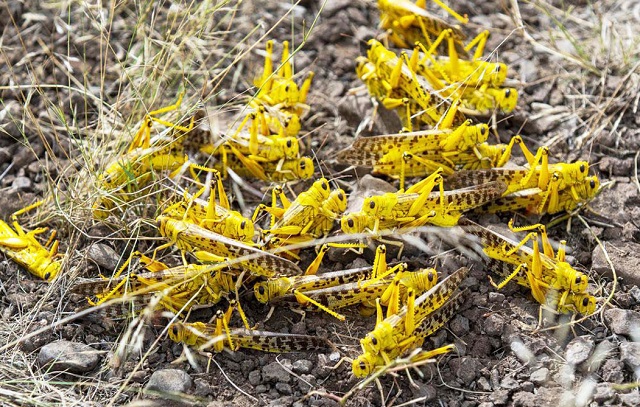
Kampala, Uganda | THE INDEPENDENT | The Russian Federation has today donated USD 3 million (11.2 billion Shillings) to fund Uganda’s efforts against desert locusts. Uganda has been invaded thrice since March with the last swarm seen on May 26, in Kaabong district in Karamoja sub-region.
The donation comes amidst fears that recent heavy rains have created ideal conditions for the pest’s reproduction in several countries across the East African region and the Horn of Africa. According to the Food and Agriculture Organisation-FAO, young locusts will become voracious adults in June just as farmers begin to harvest compounding an already bleak food security situation.
Forecasts have shown that in the coming months, desert locusts will continue breeding in Ethiopia, Kenya and Somalia, posing a big threat to Uganda and other countries in the East African region with new swarms that will form this month expected to migrate to the Sudan through South Sudan.
The Russian Ambassador to Uganda Alexander Polyakov says that the donation will support Uganda to purchase pesticides, fuel, sprayers and training of personnel to eliminate the pests. He says that the donation that he handed over to the Ministry of Agriculture in Entebbe today is part of USD 10 million (37 billion Shillings) that the Russian government extended to the UN Food and Agriculture Organization (FAO), to address the desert locust invasion in East Africa.
He noted that his government donated 53 vehicles to UN World Food Programme last year. Of these, 5 vehicles are being used to facilitate desert locust control activities in the most affected and vulnerable districts in Uganda.
Agriculture Minister Vincent Ssempijja says that the government has successfully controlled the locusts and averted food insecurity which could have cost about USD 8 million (30 billion Shillings). Ssempijja, however appealed for more funding for the provision of temporary tents and vehicles to transport field officers and storage facilities for supplies and other equipment used in pest control.
Stephen Tibeijuka Byantwale, the commissioner for crop protection says that 2,045 field officers, mainly from the Uganda People’s Defence Force and Uganda Wildlife Authority are on standby for the next swarm of desert locusts.
He explains that the Ministry of Agriculture has so far received 24 billion Shillings from the government to fight locusts. These funds were spent on clearing arrears (subscription) to the Desert Locust Control Organisation for East Africa and procuring pesticides and meeting security requirements on the affected areas among others.
Meanwhile, Dr Antonio Querido, the FAO country representative says the situation is particularly worrisome in Ethiopia, Somalia and Kenya where swarms of desert locusts are extremely large, highly mobile and are damaging food crops and forage. He says about 22,000 households have since been affected in the region.
******
URN
 The Independent Uganda: You get the Truth we Pay the Price
The Independent Uganda: You get the Truth we Pay the Price



